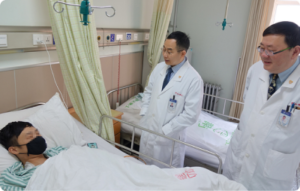
The author, Zhu Tongyu, is the vice president of Zhongshan Hospital affiliated to Fudan University, a professor of urology, and a well-known kidney transplant expert.
The original article was published on page A27 of Xinmin Evening News on June 17, 2014. The photo was taken by Oriental Morning Post.
When Xiao Li appeared again in the specialist clinic for kidney transplant follow-up, it was really difficult for us to connect the high-spirited young man in front of us with the depressed uremia patient half a year ago. Xiao Li, 34 years old, works in a well-known media in Shanghai. He was diagnosed with “uremia” a year ago and received hemodialysis treatment. Half a year ago, his mother donated his left kidney to him, and he received a living relative-donor kidney transplant in the Urology Department of Zhongshan Hospital affiliated to Fudan University.
Four years ago, Xiao Li was found to have occult blood in urine and proteinuria during a physical examination, accompanied by an increase in blood creatinine. At that time, he was studying at a university in Shanghai and was about to graduate and take a new job. At the doctor’s suggestion, he underwent a kidney puncture biopsy at a well-known hospital in Shanghai, and the pathological results showed “IgA nephropathy”. IgA nephropathy is a common primary glomerular disease, with clinical manifestations of recurrent macroscopic hematuria or microscopic hematuria, which may be accompanied by varying degrees of proteinuria. Some patients may have severe hypertension or renal insufficiency, and most patients will gradually develop uremia. After learning about his condition, Xiao Li, who was full of longing for the future, felt that he had fallen into an icy abyss. With the encouragement and comfort of his family, he mustered the courage to overcome the disease and began to actively receive treatment. After a short period of drug treatment, his condition was effectively controlled and his blood creatinine gradually returned to normal.
However, one year ago, Xiao Li began to experience edema and hypertension in both lower limbs. He went to the hospital for examination and found that his blood creatinine was close to 300 umol/L, and rose to about 1000 umol/L within a month under drug treatment. He was diagnosed with “uremia”. After that, Xiao Li began to receive peritoneal dialysis treatment, but because the effect of peritoneal dialysis was not ideal, he soon switched to hemodialysis treatment. Hemodialysis treatment three times a week, more than four hours each time, was really a torture for Xiao Li. After each hemodialysis, he felt very tired and had no energy at all. After each hemodialysis, his determination to get rid of hemodialysis was also increasing little by little.
Xiao Li comes from a single-parent family in Zhejiang Province. His father died when Xiao Li was young, and his mother raised him and his sister with great difficulty. Because Xiao Li’s condition suddenly progressed to the point of hemodialysis, the family’s life was also in chaos, and his sister’s wedding, which was originally planned to be held before the New Year, was also cancelled. Seeing the pain that her son had to endure every time hemodialysis and his increasingly thin face, Xiao Li’s mother saw it with her eyes and felt pain in her heart, and she came up with the idea of donating a kidney to her son for a kidney transplant, and her mother’s idea was also supported by her family.
After many inquiries and comparisons, Li’s mother came to the clinic of the Urology Department of Zhongshan Hospital Affiliated to Fudan University accompanied by her family. After a series of complete and detailed examinations, I believe that the mother and Xiao Li meet the requirements and conditions for living relative donor kidney transplantation, and I submitted it to the Zhongshan Hospital Ethics Committee for discussion and the Shanghai Municipal Health Bureau for approval. December 23, 2013, this is a day that Xiao Li will remember for the rest of his life. Mother Li gave one of her kidneys to her son, and also gave him a second “life”. Both operations went smoothly. Mother Li underwent a minimally invasive laparoscopic kidney removal operation. She recovered quickly after the operation and was discharged on the 5th day; Xiao Li’s blood creatinine also dropped to the normal range on the 4th day after the operation. He started to get out of bed and move around on the 6th day, and was discharged on the 10th day.
Xiao Li is unfortunate because he has uremia; Xiao Li is lucky because his mother gave him a second “life”. Today, there are nearly 2 million uremia patients in my country who are looking forward to the opportunity of kidney transplantation, and this number continues to grow every year. Due to the serious shortage of kidneys from non-living relatives, we advocate the development of mutual assistance and self-help within the family and the implementation of living relative donor kidney transplantation.

微信扫一扫
关注该公众号


